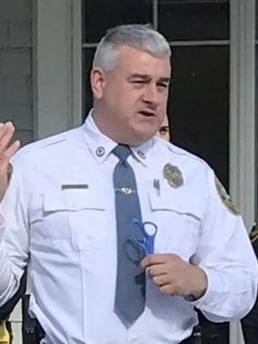Massachusetts Town Battles Over Trump Flag in Public Buildings
In a significant development that has stirred the small town of West Boylston, Massachusetts, Town Administrator James Ryan was terminated following a dispute over the display of a Donald Trump flag within the local police department. This incident has ignited discussions about the appropriateness of political symbols in government spaces, the boundaries of free speech for public employees, and the policies that govern such expressions in Massachusetts.
FREE SPEECHSTATE & LOCAL GOVERNMENT
Dr. Shawn Granger
2/25/20254 min read


The Incident: A Flag Sparks Controversy
In January 2025, during a routine tour of the West Boylston Police Department, Town Administrator James Ryan noticed a Donald Trump flag prominently displayed in the department's gymnasium. Interpreting the flag's presence as a potential civil rights violation and a breach of the town's commitment to political neutrality in public spaces, Ryan instructed Police Chief Dennis Minnich to remove the flag. Chief Minnich complied but subsequently filed a formal complaint against Ryan, challenging the directive and its implications. This internal conflict escalated, culminating in a closed-door meeting of the West Boylston Select Board, which voted 4-1 to terminate Ryan's employment.
Policies on Political Signs in Massachusetts Public Buildings
Massachusetts maintains clear guidelines regarding the display of political materials in public and government-owned properties. The State Ethics Commission prohibits public employees from utilizing government resources to support or oppose political candidates or campaigns. This prohibition involves displaying political signs, symbols, or messages in government buildings. According to the Commission, "With limited exceptions, public employees are prohibited from engaging in political activity on public work time; while wearing a public uniform; in a public building, except where equal access for such political activity is allowed; or with the use of other public resources" (State Ethics Commission, 2025).
This policy ensures that public resources are not used to influence political outcomes and that government spaces remain neutral, serving all citizens regardless of political affiliations. Political symbols in public buildings can be perceived as an endorsement by the government entity, which may alienate or intimidate individuals with differing political views.
Precedents of Removing Political Signs from Government Properties
The West Boylston incident is not isolated; similar disputes have arisen in other Massachusetts municipalities. For instance, in October 2024, a Hanson, Massachusetts resident projected a "Trump 2024" sign onto a municipal water tower. Town officials issued a cease-and-desist order and imposed a daily fine of $100 until the projection ceased. Town Administrator Lisa Green stated, "The town does not allow political signs on municipal property nor endorse any candidates" (Associated Press, 2024). This action underscores the commitment of Massachusetts towns to uphold political neutrality in public spaces.
Balancing Free Speech and Government Speech
The First Amendment of the U.S. Constitution guarantees individuals the right to free speech, allowing citizens to express their political views on private property without undue interference. The American Civil Liberties Union of Massachusetts emphasizes, "Massachusetts residents have the right to display signs in their yards or on their other personal property so long as the signs meet reasonable requirements" (ACLU Massachusetts, n.d.).
However, public employees’ expression of political views within the scope of their official duties is subject to limitations. When a public employee displays a political symbol in a government building, it can be construed as government speech, which must remain neutral to serve all constituents fairly. The State Ethics Commission advises, "A police officer could not hold a sign supporting a political candidate while on duty or in uniform" (State Ethics Commission, 2025).
This distinction ensures that personal political beliefs do not interfere with public duties and that government entities do not appear to endorse specific political positions.
The Role of Politics in the Firing of James Ryan
The termination of James Ryan highlights the complex interplay between administrative decisions and political undercurrents. While the immediate cause was his directive to remove the Trump flag, the situation escalated due to differing interpretations of appropriate conduct and authority. Ryan's attorney, John Clifford, contended that the Select Board's decision was based solely on Chief Minnich's allegations, stating, "I asked that Chief Minnich be present at this event to testify in support of his allegations... I am informed Chief Minnich will not be produced as a witness" (NBC Boston, 2025).
This scenario suggests that internal disagreements and political dynamics within the town's leadership may have influenced the outcome. Rather than resolving the issue through internal discussions, the matter became a public dispute, reflecting broader national political tensions.
Massachusetts' Commitment to Political Neutrality in Public Spaces
Massachusetts state policies are designed to maintain political neutrality in public spaces, ensuring that government buildings serve all individuals impartially. The display of political symbols in such spaces can undermine public trust and create perceptions of bias. The State Ethics Commission notes that public employees are prohibited from using public resources for political purposes, reinforcing the principle that government entities must not engage in political advocacy (State Ethics Commission, 2025).
This commitment to neutrality ensures that all citizens feel equally represented and that public resources are used solely for governmental functions, not political campaigning.
Conclusion
The dismissal of West Boylston Town Administrator James Ryan over removing a political flag from a police department gymnasium underscores the delicate balance between individual free speech rights and the necessity for political neutrality in government spaces. While private citizens and businesses are free to express political preferences on their property, public employees and institutions must adhere to policies that prevent using public resources for political purposes. Mr. Ryan was following the letter of the law, but that did not support him in the end. This incident serves as a reminder of the importance of clear guidelines and open communication within municipal administrations to navigate the complex intersection of personal expression and public responsibility. It’s unclear if West Boylston had a clear Town policy on political signage that would presumably have followed state laws and supported the Town Administrator’s actions.
References
American Civil Liberties Union of Massachusetts. (n.d.). Know your rights: Political signs on private property. Retrieved from https://www.aclum.org/en/know-your-rights/know-your-rights-political-signs-private-property
Associated Press. (2024, October 14). Town fines resident who projected Trump sign onto municipal water tower. Retrieved from https://apnews.com/article/2230afa7c1da73562e2fceb1b8fa16da
NBC Boston. (2025, February). West Boylston fires town administrator amid police station Trump flag conflict. Retrieved from https://www.nbcboston.com/news/politics/west-boylston-fires-town-administrator-amid-police-station-trump-flag-conflict/3640710/
State Ethics Commission. (2025). Guidelines on political activity for public employees in Massachusetts. Retrieved from https://www.mass.gov/orgs/state-ethics-commission


